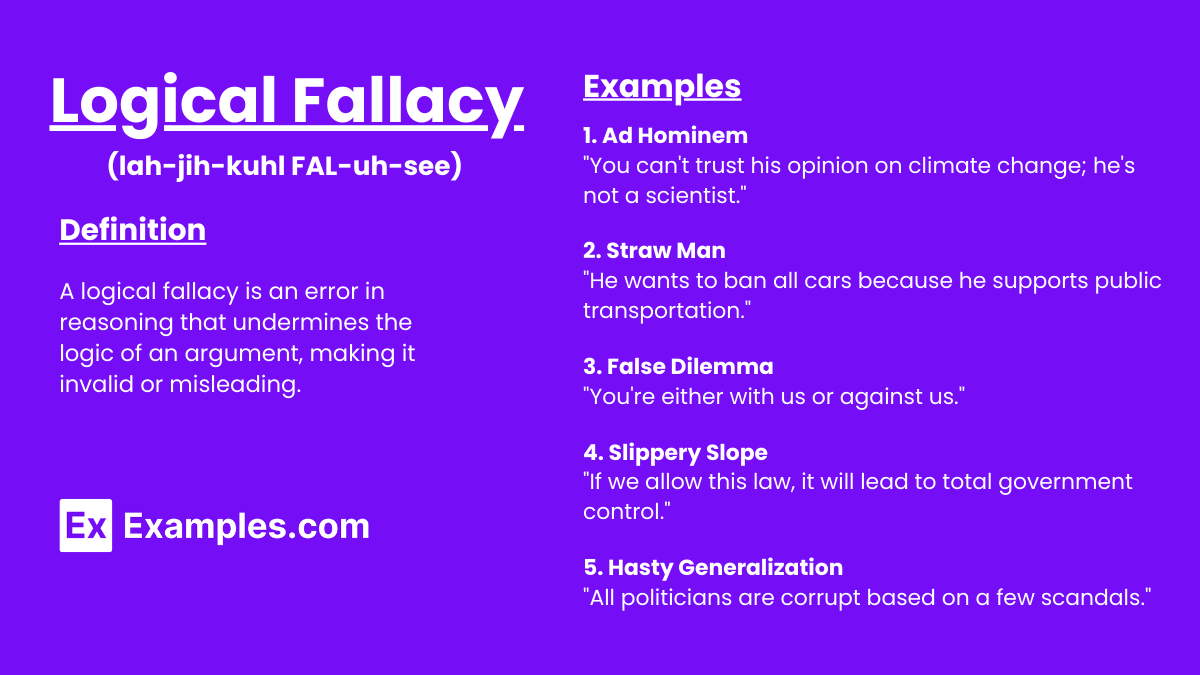75+ Logical Fallacy Examples
Logical fallacies are common errors in reasoning that undermine the logic of an argument. Understanding these fallacies is crucial for clear, persuasive, and logical communication. This article will provide a step-by-step guide on how to identify and use logical fallacies, with examples and FAQs to help you navigate this complex topic.
What is a Logical Fallacy?
A logical fallacy is a flaw in reasoning that leads to invalid arguments. These errors often occur in debates and arguments, where they can be used intentionally or unintentionally to persuade or manipulate an audience. Logical fallacies can range from simple bias examples to more complex rhetorical devices.
Types of/ Common Logical Fallacies
Logical fallacies are errors in reasoning that undermine the logic of an argument. They can be either formal (related to the structure of the argument) or informal (related to the content of the argument). Understanding different types of logical fallacies can help you identify weak arguments and improve your own reasoning skills.
1. Ad Hominem
An ad hominem fallacy attacks the person making the argument rather than the argument itself. This is often used to discredit the opponent.
Example: “You can’t trust John’s opinion on climate change because he’s not a scientist.”
2. Straw Man
A straw man fallacy occurs when someone misrepresents or oversimplifies an opponent’s argument to make it easier to attack.
Example: “Vegetarians say that no one should eat meat, but that would mean everyone would miss out on essential nutrients.”
3. Appeal to Ignorance (Argumentum ad Ignorantiam)
This fallacy asserts that a proposition is true because it has not yet been proven false, or vice versa.
Example: “No one has ever proven that UFOs don’t exist, so they must be real.”
4. False Dilemma (False Dichotomy)
A false dilemma fallacy presents only two options or sides when there are actually more available.
Example: “You’re either with us, or you’re against us.”
5. Slippery Slope
The slippery slope fallacy argues that a relatively small first step inevitably leads to a chain of related events culminating in a significant (usually negative) effect.
Example: “If we allow students to redo assignments for a better grade, next they’ll want to retake exams, and eventually, they’ll expect to get their degree without any effort.”
6. Circular Reasoning (Begging the Question)
Circular reasoning occurs when the conclusion of an argument is used as a premise of the same argument.
Example: “I’m trustworthy because I always tell the truth.”
7. Hasty Generalization
A hasty generalization fallacy occurs when a conclusion is reached based on insufficient or biased evidence.
Example: “My two neighbors are loud, so everyone in this neighborhood must be noisy.”
8. Red Herring
A red herring fallacy involves diverting attention from the real issue by focusing on an irrelevant issue.
Example: “Why worry about the environment when there are so many homeless people who need help?”
9. Bandwagon (Ad Populum)
The bandwagon fallacy argues that one must accept or reject an argument because everyone else is doing so.
Example: “Everyone is buying the latest smartphone, so it must be the best one available.”
10. Appeal to Authority (Argumentum ad Verecundiam)
This fallacy occurs when an argument is deemed true or false based on the authority of someone who supports it, rather than the evidence.
Example: “This dietary supplement must be effective because a famous actor uses it.”
11. Post Hoc Ergo Propter Hoc (False Cause)
This fallacy assumes that if one event happens after another, then the first event must have caused the second.
Example: “I wore my lucky shirt, and then I passed my exam. Therefore, the shirt made me pass.”
12. Appeal to Emotion
This fallacy manipulates an emotional response in place of a valid or compelling argument.
Example: “Think of the children! We must ban all violent video games.”
13. Equivocation
Equivocation occurs when a word with multiple meanings is used ambiguously in an argument, misleading the audience.
Example: “The sign said ‘fine for parking here,’ so I thought it was okay to park.”
14. Non Sequitur
A non sequitur is an argument where the conclusion does not logically follow from the premises.
Example: “She drives a BMW, so she must be wealthy.”
15. Appeal to Tradition
This fallacy argues that something is better or correct simply because it is older, traditional, or has always been done that way.
Example: “We shouldn’t change the curriculum because it has always been like this.”
Logical Fallacy Examples
- “You can’t trust John’s opinion on climate change because he’s not a scientist.” (Ad Hominem)
- “Vegetarians say that no one should eat meat, but that would mean everyone would miss out on essential nutrients.” (Straw Man)
- “No one has ever proven that UFOs don’t exist, so they must be real.” (Appeal to Ignorance)
- “You’re either with us, or you’re against us.” (False Dilemma)
- “If we allow students to redo assignments for a better grade, next they’ll want to retake exams, and eventually, they’ll expect to get their degree without any effort.” (Slippery Slope)
- “I’m trustworthy because I always tell the truth.” (Circular Reasoning)
- “My two neighbors are loud, so everyone in this neighborhood must be noisy.” (Hasty Generalization)
- “Why worry about the environment when there are so many homeless people who need help?” (Red Herring)
- “Everyone is buying the latest smartphone, so it must be the best one available.” (Bandwagon)
- “This dietary supplement must be effective because a famous actor uses it.” (Appeal to Authority)
- “I wore my lucky shirt, and then I passed my exam. Therefore, the shirt made me pass.” (Post Hoc Ergo Propter Hoc)
- “Think of the children! We must ban all violent video games.” (Appeal to Emotion)
- “The sign said ‘fine for parking here,’ so I thought it was okay to park.” (Equivocation)
- “She drives a BMW, so she must be wealthy.” (Non Sequitur)
- “We shouldn’t change the curriculum because it has always been like this.” (Appeal to Tradition)
Where can I find logical fallacies?
1. Debates and Discussions
- Political debates
- Public forums
- Panel discussions
2. Media and News Outlets
- Editorials and opinion pieces
- News articles
- Talk shows and interviews
3. Advertising and Marketing
- Commercials
- Print ads
- Online advertisements
4. Social Media
- Posts and comments on platforms like Facebook, Twitter, and Reddit
- Discussions in online communities and forums
5. Academic Settings
- Student papers and essays
- Classroom debates
- Academic journals (though less common)
6. Everyday Conversations
- Discussions with friends and family
- Workplace conversations
- Public speaking events
7. Books and Publications
- Non-fiction books
- Self-help books
- Articles in magazines and journals
8. Legal Arguments
- Courtroom debates
- Legal briefs and documents
9. Political Campaigns
- Speeches and rallies
- Campaign advertisements
- Political statements and slogans
10. Internet Content
- Blogs and vlogs
- Podcasts
- Online tutorials and educational content
How to avoid using logical fallacies
1. Understand Logical Fallacies
- Educate Yourself: Learn about different types of logical fallacies and how they manifest in arguments.
- Stay Updated: Regularly review and refresh your knowledge on logical fallacies to recognize them easily.
2. Build Strong Arguments
- Use Clear Evidence: Base your arguments on well-researched, credible evidence.
- Cite Sources: Always cite reliable sources to support your claims.
- Be Specific: Avoid vague or ambiguous statements that can lead to misunderstandings.
3. Structure Your Argument Logically
- Follow Logical Flow: Ensure that your premises logically lead to your conclusion.
- Avoid Assumptions: Don’t assume that your audience shares your beliefs or background knowledge.
- Use Sound Reasoning: Make sure your reasoning is valid and free from errors.
4. Be Open-Minded
- Consider Counterarguments: Think about possible counterarguments and address them logically.
- Accept Criticism: Be open to feedback and willing to revise your arguments if they are found to be flawed.
5. Stay Relevant
- Stay on Topic: Ensure all your points are relevant to the main argument.
- Avoid Distractions: Don’t introduce irrelevant issues that divert attention from the main argument.
6. Avoid Emotional Manipulation
- Stay Rational: Focus on logical reasoning rather than appealing to emotions.
- Be Respectful: Avoid personal attacks or emotionally charged language that can undermine your argument.
7. Use Precise Language
- Define Terms: Clearly define key terms to avoid misunderstandings.
- Avoid Ambiguity: Use precise language to ensure your argument is clearly understood.
8. Seek Feedback
- Get Opinions: Ask others to review your arguments and identify potential fallacies.
- Practice Debates: Engage in discussions and debates to refine your argumentation skills.
Examples of Avoiding Logical Fallacies
Ad Hominem:
- Avoid: “You can’t trust John’s opinion on climate change because he’s not a scientist.”
- Better: “Let’s look at the scientific evidence on climate change rather than focusing on John’s qualifications.”
Straw Man:
- Avoid: “Vegetarians say that no one should eat meat, but that would mean everyone would miss out on essential nutrients.”
- Better: “While some vegetarians advocate for a meat-free diet, let’s discuss how to ensure a balanced diet for everyone.”
False Dilemma:
- Avoid: “You’re either with us, or you’re against us.”
- Better: “There are multiple perspectives on this issue, and we should consider all of them.”
Logical Fallacy Examples in Real Life
- “My grandfather smoked his entire life and lived until 97, so smoking can’t be that bad.”
- “If we allow students to use calculators, next they’ll expect to use them on every test.”
- “You can’t argue against the new company policy because you’ve only been here for a month.”
- “Everyone in our neighborhood drives an SUV, so it must be the best type of car.”
- “If you don’t donate to this charity, it means you don’t care about the homeless.”
Logical Fallacy Examples in Sentences
- “You’re either part of the solution or part of the problem.”
- “My two friends failed the math test, so the test must be unfair.”
- “Why should we listen to her argument on climate change? She’s not even a scientist.”
- “You must not support animal rights if you’re eating a hamburger.”
- “Since no one has disproven ghosts, they must exist.”
Logical Fallacy Examples in Media
- “This celebrity endorses this diet pill, so it must be effective.”
- “Politician X can’t be trusted because he was late to a meeting once.”
- “This product is the best because it’s the most popular on social media.”
- “The new smartphone is obviously superior because everyone is talking about it.”
- “Our country must be the best because we have the most powerful military.”
Logical Fallacy Examples for Students
- “If we let one student redo an assignment, soon everyone will want to redo all their work.”
- “You didn’t do well on the test because you didn’t study enough.”
- “Every time you use the vending machine, it eats your money. The machine must be rigged.”
- “Our class must be the best because we have the highest attendance.”
- “You can’t trust Mark’s opinion on the group project; he’s always late to class.”
Logical Fallacy Examples in Books
- “In 1984, the government claims that ‘War is Peace,’ a clear contradiction used to control thought.”
- “In To Kill a Mockingbird, the idea that all black people are bad is an overgeneralization (hasty generalization).”
- “In Animal Farm, Squealer uses false dichotomy by claiming, ‘You’re either with us, or you’re against us.'”
- “In The Catcher in the Rye, Holden often uses hasty generalizations about adults being ‘phonies.'”
- “In The Great Gatsby, Tom’s belief in the superiority of his social class is an appeal to tradition.”
Logical Fallacy Examples in Advertising
- “Use this toothpaste; 9 out of 10 dentists recommend it.” (Appeal to Authority)
- “Everyone is switching to this brand, so you should too.” (Bandwagon)
- “You must act now! Supplies are limited!” (Appeal to Emotion)
- “Our product is the best because it’s made with natural ingredients.” (Naturalistic Fallacy)
- “Only our insurance offers complete peace of mind.” (False Dilemma)
Logical Fallacy Examples in Movies
- “In The Dark Knight, Batman is either a hero or a vigilante; no in-between.” (False Dilemma)
- “In The Incredibles, Syndrome believes he can become a hero by eliminating all others.” (False Cause)
- “In Star Wars, ‘Only a Sith deals in absolutes.'” (False Dichotomy)
- “In Jurassic Park, ‘Dinosaurs and man, two species separated by 65 million years of evolution, have just been suddenly thrown back into the mix together.'” (Slippery Slope)
- “In Mean Girls, Regina George says, ‘So you think you’re really pretty?'” (Straw Man)
Editable Logical Fallacies Example
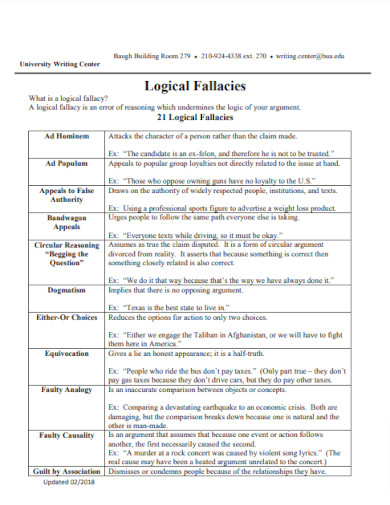
bua.edu
Common Logical Fallacies Example
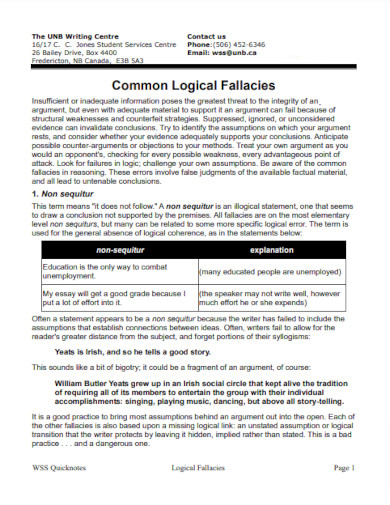
canada.ca
Printable Logical Fallacies Example

habib.edu.pk
Master List of Logical Fallacies Example
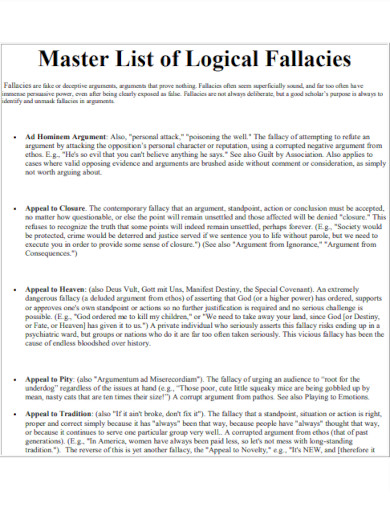
cf.linnbenton.edu
Avoiding Logical Fallacies Example
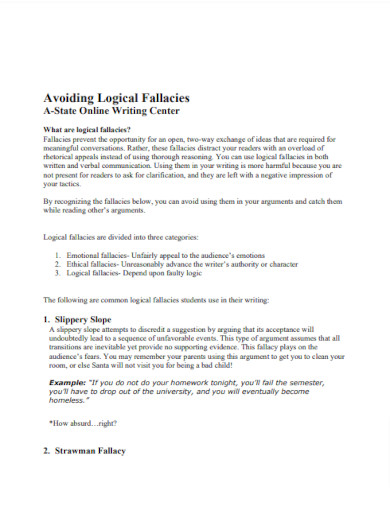
astate.edu
Overview of Logical Fallacies Example
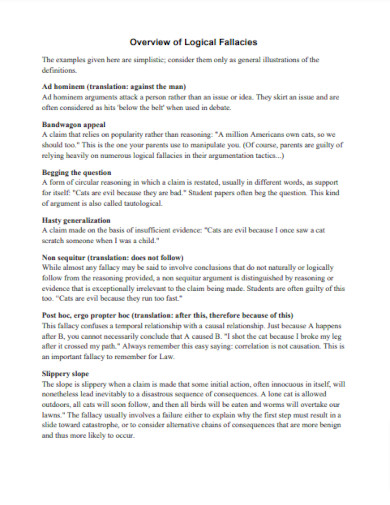
dornsife.usc.edu
Logical Fallacy Quick Sheet Example
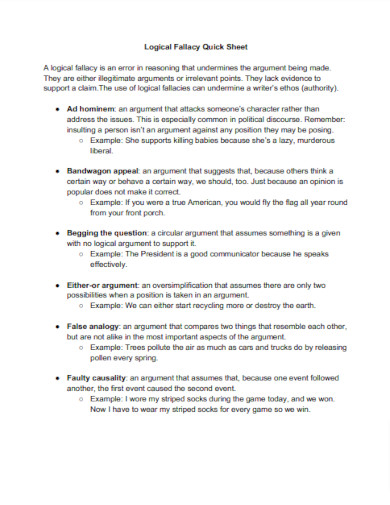
cctech.edu
Simple Logical Fallacies Example
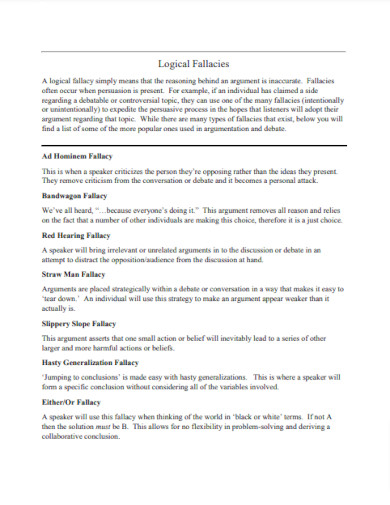
walton.uark.edu
How to Use Logical Fallacies
Understanding logical fallacies can help you identify them’ others in arguments and avoid them in your own.’s Here a step-by-step guide to help you navigate this process:
Fallacy Template
Use a fallacy template to help identify common logical fallacies. This template will outline the structure of the fallacy, making it easier to spot in an argument.
Implicit Bias
Recognize your own implicit biases that may lead to logical fallacies. By being aware of these biases, can you arguments your ensure are based on facts and logic, not prejudice or stereotypes.
Deductive Reasoning
Use deductive reasoning to test the validity of an argument. If the conclusion doesn’t logically follow from the premises, it’s likely a fallacy.
Open-Ended Questions
Ask open-ended questions to challenge fallacious arguments. This can expose the flaws in the reasoning and promote a more logical discussion.
What is a leading question and how can it lead to a logical fallacy?
A leading question is one that prompts or encourages the desired answer. It can lead to a logical fallacy by manipulating the respondent into agreeing with the questioner’s viewpoint, rather than allowing for an unbiased response.
Can you give an example of a logical fallacy in a debate speech?
Yes, an example could be the use of ad hominem attacks, where the speaker attacks the person rather than addressing their argument. This is a common fallacy in debate speech examples.
How can logical fallacies be used in persuasive speech?
Logical fallacies can be used in persuasive speech to manipulate the audience’s emotions or beliefs. However, this is not a recommended practice as it undermines the integrity of the argument and can lead to misinformation.
What is an ad hominem fallacy?
An ad hominem fallacy attacks the person making the argument rather than addressing the argument itself.
What is a straw man fallacy?
A straw man fallacy misrepresents an opponent’s argument to make it easier to attack or refute.
Can emotional appeals be fallacies?
Yes, emotional appeals can be fallacies if they manipulate emotions to distract from logical reasoning or lack evidence.
What is a false dilemma?
A false dilemma presents only two options or sides, ignoring other possible alternatives or solutions.
How do I recognize a slippery slope fallacy?
A slippery slope fallacy claims that a small first step will inevitably lead to a chain of related negative events.
What is circular reasoning?
Circular reasoning is when the conclusion of an argument is used as a premise within the same argument.
Are logical fallacies always intentional?
No, logical fallacies can be unintentional, often resulting from poor reasoning or lack of awareness.
Understanding and identifying logical fallacies is a crucial skill for clear and logical communication. By using tools like a fallacy template and practicing deductive reasoning, you can avoid these common errors in your own arguments and identify them in others. With resources like “34+ Logical Fallacy Examples” and “4+ Persuasive Speech Examples & Samples in DOC,” mastering this skill becomes a less daunting task.



